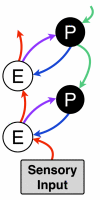Theory of mind: a neural prediction problem
- PMID: 24012000
- PMCID: PMC4041537
- DOI: 10.1016/j.neuron.2013.08.020
Theory of mind: a neural prediction problem
Abstract
Predictive coding posits that neural systems make forward-looking predictions about incoming information. Neural signals contain information not about the currently perceived stimulus, but about the difference between the observed and the predicted stimulus. We propose to extend the predictive coding framework from high-level sensory processing to the more abstract domain of theory of mind; that is, to inferences about others' goals, thoughts, and personalities. We review evidence that, across brain regions, neural responses to depictions of human behavior, from biological motion to trait descriptions, exhibit a key signature of predictive coding: reduced activity to predictable stimuli. We discuss how future experiments could distinguish predictive coding from alternative explanations of this response profile. This framework may provide an important new window on the neural computations underlying theory of mind.
Copyright © 2013 Elsevier Inc. All rights reserved.
Figures



References
-
- Aichhorn M, Perner J, Weiss B, Kronbichler M, Staffen W, Ladurner G. Temporo-parietal junction activity in theory-of-mind tasks: falseness, beliefs, or attention. J. Cogn. Neurosci. 2009;21:1179–1192. - PubMed
-
- Allison T, Puce A, McCarthy G. Category-sensitive excitatory and inhibitory processes in human extrastriate cortex. J. Neurophysiol. 2002;88:2864–2868. - PubMed
-
- Baker CL, Saxe R, Tenenbaum JB. Action understanding as inverse planning. Cognition. 2009;113:329–349. - PubMed
-
- Baker CL, Saxe RR, Tenenbaum JB. Bayesian theory of mind: Modeling joint belief-desire attribution; Proceedings of the thirty-second annual conference of the cognitive science society; 2011.pp. 2469–2474.
Publication types
MeSH terms
Grants and funding
LinkOut - more resources
Full Text Sources
Other Literature Sources

